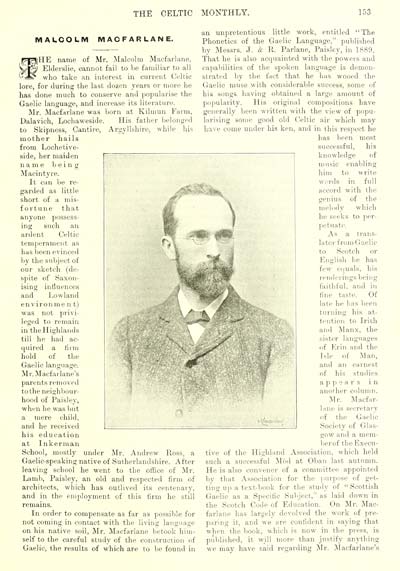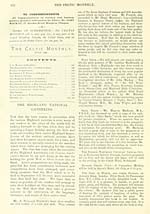Blair Collection > Celtic monthly > Volume 1, 1893
(181)
Download files
Complete book:
Individual page:
Thumbnail gallery: Grid view | List view

THE CELTIC MONTHLY.
153
MALCOLM MAOFARLANE.
|^|P||HE name of Mr. Malcolm Maofarlane,
V'tv 1 Elderslie, cannot fail to be familiar to all
^■sisr who take an interest in current Celtic
lore, for during the last dozen years or more he
has done much to conserve and popularise the
Gaelic language, and increase its literature.
Mr. Macfarlane was born at Kiltnun Farm,
Dalavich, Lochaweside. His father belonged
to Skipness, Cantire, Argyllshire, while his
mother hails
from Lochetive-
side, her maiden
name being
Mae in tyre.
It can be re-
garded as little
short of a mis-
fortune that
anyone possess-
ing such an
ardent Celtic
temperament as
has been evinced
by the subject of
our sketch (de-
spite of Saxon-
ising influences
and Lowland
environme n t)
was not privi-
leged to remain
in the Highlands
till he had ac-
quired a Mini
hold of the
Gaelic language.
Mr. Macfai lane's
parents removed
to the neighbour-
hood of Paisley,
when he was but
a mere child,
and he received
his education
at Inkerman
School, mostly under Mr. Andrew Ross, a
Gaelic-speaking native of Sutherlandshire. After
leaving school he went to the office of Mr.
Lamb, Paisley, an old and respected firm of
architects, which has outlived its centenary,
and in the employment of this firm he still
remains.
In order to compensate as far as possible for
not coming in contact with the living language
on his native soil, Mr. Maefarlane betook him-
self to the careful study of the construction of
Gaelic, the results of which are to be found in
an unpretentious little work, entitled "The
Phonetics of the Gaelic Language." published
by Messrs. J. & R. Parlane,"" Paisley, in 1889.
That he is also acquainted with the powers and
capabilities of the spoken language is demon-
strated by the fact that he has wooed the
Gaelio muse with considerable success, some of
his songs having obtained a large amount of
popularity. His original compositions have
generally been written with the view of popu-
larising some good old Celtic air which may
have come under his ken, and in this respect he
has been most
successful, his
knowledge of
music enabling
ful
accord with the
genius of the
melody which
he seeks to per-
petuate.
As a trans-
lator from Gaelic
to Scotch or
English he has
few equals, his
renderings being
faithful, and in
tin.' taste. Of
late he has been
turning his at-
tention to Irish
and Manx, the
sister languages
of Erin and the
Isle of Man,
and an earnest
of his studies
a p 1 1 9 a r s i n
another column.
Mr. Macfar-
liine is secretary
of the Gaelic
Society of Glas-
gow and a mem-
berof the Execu-
tive of the Highland Association, which held
such a successful Mod at Oban last autumn.
He is also convener of a committee appointed
by that Association for the purpose of get-
ting up u text-book for the study of "Scottish
Gaelic as a Specific Subject," as laid down in
the Scotch Code of Education. On Mr. Mac-
farlane has largely devolved the work of pre-
paring it, and we are confident in saying that
when the book, which is now in the press, is
published, it will more than justify anything
we may have said regarding Mr. Macfarlane's
153
MALCOLM MAOFARLANE.
|^|P||HE name of Mr. Malcolm Maofarlane,
V'tv 1 Elderslie, cannot fail to be familiar to all
^■sisr who take an interest in current Celtic
lore, for during the last dozen years or more he
has done much to conserve and popularise the
Gaelic language, and increase its literature.
Mr. Macfarlane was born at Kiltnun Farm,
Dalavich, Lochaweside. His father belonged
to Skipness, Cantire, Argyllshire, while his
mother hails
from Lochetive-
side, her maiden
name being
Mae in tyre.
It can be re-
garded as little
short of a mis-
fortune that
anyone possess-
ing such an
ardent Celtic
temperament as
has been evinced
by the subject of
our sketch (de-
spite of Saxon-
ising influences
and Lowland
environme n t)
was not privi-
leged to remain
in the Highlands
till he had ac-
quired a Mini
hold of the
Gaelic language.
Mr. Macfai lane's
parents removed
to the neighbour-
hood of Paisley,
when he was but
a mere child,
and he received
his education
at Inkerman
School, mostly under Mr. Andrew Ross, a
Gaelic-speaking native of Sutherlandshire. After
leaving school he went to the office of Mr.
Lamb, Paisley, an old and respected firm of
architects, which has outlived its centenary,
and in the employment of this firm he still
remains.
In order to compensate as far as possible for
not coming in contact with the living language
on his native soil, Mr. Maefarlane betook him-
self to the careful study of the construction of
Gaelic, the results of which are to be found in
an unpretentious little work, entitled "The
Phonetics of the Gaelic Language." published
by Messrs. J. & R. Parlane,"" Paisley, in 1889.
That he is also acquainted with the powers and
capabilities of the spoken language is demon-
strated by the fact that he has wooed the
Gaelio muse with considerable success, some of
his songs having obtained a large amount of
popularity. His original compositions have
generally been written with the view of popu-
larising some good old Celtic air which may
have come under his ken, and in this respect he
has been most
successful, his
knowledge of
music enabling
ful
accord with the
genius of the
melody which
he seeks to per-
petuate.
As a trans-
lator from Gaelic
to Scotch or
English he has
few equals, his
renderings being
faithful, and in
tin.' taste. Of
late he has been
turning his at-
tention to Irish
and Manx, the
sister languages
of Erin and the
Isle of Man,
and an earnest
of his studies
a p 1 1 9 a r s i n
another column.
Mr. Macfar-
liine is secretary
of the Gaelic
Society of Glas-
gow and a mem-
berof the Execu-
tive of the Highland Association, which held
such a successful Mod at Oban last autumn.
He is also convener of a committee appointed
by that Association for the purpose of get-
ting up u text-book for the study of "Scottish
Gaelic as a Specific Subject," as laid down in
the Scotch Code of Education. On Mr. Mac-
farlane has largely devolved the work of pre-
paring it, and we are confident in saying that
when the book, which is now in the press, is
published, it will more than justify anything
we may have said regarding Mr. Macfarlane's
Set display mode to: Large image | Transcription
Images and transcriptions on this page, including medium image downloads, may be used under the Creative Commons Attribution 4.0 International Licence unless otherwise stated. ![]()
| Early Gaelic Book Collections > Blair Collection > Celtic monthly > Volume 1, 1893 > (181) |
|---|
| Permanent URL | https://digital.nls.uk/75843378 |
|---|
| Description | Vol. I. |
|---|---|
| Shelfmark | Blair.54 |
| Attribution and copyright: |
|
| Description | A selection of books from a collection of more than 500 titles, mostly on religious and literary topics. Also includes some material dealing with other Celtic languages and societies. Collection created towards the end of the 19th century by Lady Evelyn Stewart Murray. |
|---|
| Description | Selected items from five 'Special and Named Printed Collections'. Includes books in Gaelic and other Celtic languages, works about the Gaels, their languages, literature, culture and history. |
|---|

